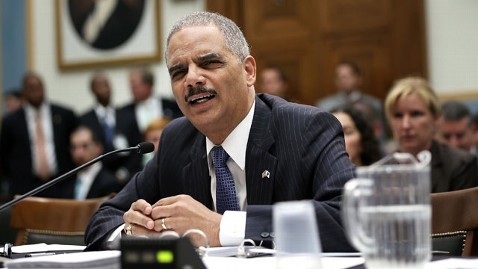Did Attorney General Eric Holder OK Attempt to Search Journalist's Email?

Alex Wong/Getty Images
The Justice Department stopped short of saying that Attorney General Eric Holder O.K.'d the investigation into Fox News reporter James Rosen. But critics have seized on a comment Holder made last week, asking if the attorney general misled Congress.
The Obama administration has been criticized for reportedly seizing Rosen's emails and phone records, and for tracking his movement in and out of the State Department through security-badge records, as it investigated possible leaks of information about North Korea. Last week's Washington Post report added fuel to an already controversial time for the Justice Department, which seized phone records of Associated Press reporters and offices.
In a statement on Friday, the Justice Department said the Rosen investigation had been approved "at the highest levels" of the Justice Department, including "discussions with the Attorney General."
Here's how the department explained its decision to investigate Rosen, in a background statement:
The Department takes seriously the First Amendment right to freedom of the press. In recognition of this, the Department took great care in deciding that a search warrant was necessary in the Kim matter, vetting the decision at the highest levels of the Department, including discussions with the Attorney General. After extensive deliberations, and after following all applicable laws, regulations and policies, the Department sought an appropriately tailored search warrant under the Privacy Protection Act. And a federal magistrate judge made an independent finding that probable cause existed to approve the search warrant.
Attorney General Holder understands the concerns that have been raised by the media and has initiated a reevaluation of existing Department policies and procedures. This review will include extensive engagement with representatives of the media. The Department must strike the appropriate balance between its obligation to enforce the laws preventing leaks of classified information and First Amendment rights, and, through a new media shield law and appropriate updates to the Department's internal guidelines, we are committed to achieving that balance.
When Holder appeared before the House Judiciary Committee on May 15, four days before the Post reported on the Rosen investigation, Holder expressed skepticism of prosecuting reporters, as lawmakers asked him about the AP probe.
"You've got a long way to go to try to prosecute people - the press for the publication of that material," Holder told the committee, according to a transcript service.
But he also said that he had never been aware of potential prosecutions of reporters - as there was never an intent to prosecute reporters but rather the search was intended to find the source of leaks.
"Well, I would say this. With regard to the potential prosecution of the press for the disclosure of material, that is not something that I've ever been involved in, heard of or would think would be a wise policy," Holder said, responding to Georgia Democratic Rep. Hank Johnson's suggestion that reporters' First Amendment rights should be protected.
The Rosen leak was part of another prosecution - of the alleged leaker - but the Justice Department did suggest, in seeking a warrant for Rosen's G-mail account, that he may have broken the law.
FBI agent Reginald Reyes wrote in an affidavit that "there is probably cause to believe that the Reporter has committed or is committing a violation of section 793(d), as an aider and abbettor and/or co-conspirator, to which the materials relate."
Conservatives have seized on Holder's comment, asking if the attorney general lied to Congress when he made it. Fox's Karl Rove has asked that question, as have Hot Air's Ed Morrissey and Townhall.com's Katie Pavlich.